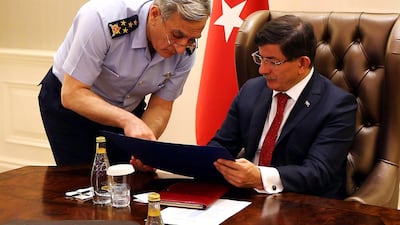ISTANBUL // Turkey on Saturday expanded its cross-border strikes against ISIL in Syria to include Kurdish militant bases in northern Iraq, potentially alienating the most effective ground forces against the extremist group and effectively ending its two-year ceasefire with Kurdistan Worker’s Party (PKK).
Turkish air force jets struck PKK shelters, bunkers, caves, storages facilities and other “logistical points”, the government said, including in the Qandil mountains where the group’s command is based.
It was the first time Turkish jets have struck Kurd positions in northern Iraq since a peace deal was announced in 2013 between Ankara and the PKK, which has waged a battle for Kurdish rights in Turkey since 1984 that has claimed more than 40,000 lives.
The PKK’s military command responded by declaring that the truce reached with jailed Kurdish leader Abdullah Ocalan had “become meaningless” and would be replaced with “an immediate expansion in armed resistance”.
Turkish prime minister Ahmet Davutoglu in turn pledged to “take all the necessary measures if the PKK continues its attacks.”
Turkey had on Friday launched two rounds of ground and air strikes on ISIL targets in Syria for the first time, actively joining the US-led global coalition against the extremist group. Ankara also agreed to allow other coalition members to launch strikes from bases on its territory.
The actions followed a suicide bombing in the town of Suruc on Monday that killed 32 people and the death of a Turkish border guard on Thursday, both of which Ankara blamed on ISIL. Turkish authorities also intensified a countrywide crackdown on suspected ISIL members, with nearly 600 people arrested in raids since Friday.
The bombing in the Kurdish majority town near the Syrian border renewed accusations by the PKK that the government was covertly supporting ISIL. The group has attacked police stations and military outposts throughout Turkey’s Kurdish-majority south-east since the bombing.
It said two police officers shot dead in the city of Sanliurfa on Wednesday had aided the Suruc bomber.
“Turkey now faces a two-front war,” said Behlul Ozkan, an assistant professor of social sciences at Marmara University in Istanbul. “One objective is clearing out ISIL at home and along the Syrian border, which carries the glaring threat of retaliatory attacks,” he said. “At the same time, Ankara has to show the PKK it is serious about deterring attacks.”
Faced with a common enemy in ISIL, Ankara and Kurdish rebels might appear to have more reason to unite than ever. Kurdish leader Ocalan even came close an historic peace deal with Ankara earlier this year, though the agreement was shelved in the run-up to Turkey's June elections.
Yet Kurdish anger against Ankara has been simmering since last October, when ISIL laid siege to the Syrian border town of Kobani.
While the US-led coalition organised weapon drops to the town’s Kurdish defenders, Turkish president Recep Tayyip Erdogan declared that Kobani’s PKK-linked fighters were, in Ankara’s eyes, “the same as Daesh”.
However, with the coalition’s backing the fighters of the Kurdish People’s Protection Units (YPG) have proved the most effective fighters against ISIL in Syria, not only repelling the attack on Kobani in January but going on to claim key territory from the extremists in recent months.
The comments by Mr Erdogan fuelled accusations by the Kurdish-rooted Peoples’ Democratic Party (HDP) that Ankara’s failure to stop the flow of ISIL’s foreign foreign recruits across its border and general hands-off approach towards the extremists were evidence of a covert alliance between the group and Mr Erdogan’s Justice and Development Party (AKP).
Turkey’s reluctance to act against ISIL may have been out of concerns for its own security.
“Now that Turkey is taking some clear measures against ISIL, maybe people could change their minds,” said Arzu Yilmaz, a researcher on Kurdish affairs at Ankara University. “But it is clearly too late. Senior members of the PKK have become convinced of that ISIL is a creation of the AKP.”
Along with the start of strikes against ISIL and allowing the use of Turkish airbases to strike the group in Syria, officials said on Saturday that there were plans in the coming months to create an “ISIL-free zone” in Syria along the last 95km stretch of border controlled by the group.
These new steps show that “the Turkish republic is pretty much all-in versus ISIL,” said Francis Ricciardone, a former US ambassador to Turkey.
This has not convinced the Kurds, who condemned recent anti-terror raids for targeting their community as well as ISIL members.
“It’s obvious that anti-ISIL arrests are going to be limited in scope,” said Ertugrul Kurkcu, a deputy for the HDP.
“Meanwhile, over 200 of our party members and officials have been detained. Only the Kurds have stood up against ISIL.”
Though Mr Kurkcu condemned the recent violence by Kurdish insurgents, vigilante killings of suspected ISIL members have increased in recent days.
The PKK’s youth wing claimed it had killed an ISIL militant in Istanbul earlier this week, while in the Turkish city of Adana, a member of a Kurdish Islamist party was fatally shot.
Amid this internal conflict, ISIL is more likely than ever to launch an attack that might further destabilise Turkey, said Mr Ozkan. “ISIL is estimated to have around 700 Turkish-born members currently. We know there are sleeper cells in Turkey, and the situation is extremely risky,” he said.
He said Ankara’s action against the extremsits had been long overdue.
“Turkey is doing something it knows it must do. But Turkey remains vulnerable, and it’s a shame that this crackdown didn’t begin long before ISIL became so entrenched in Turkey.”
foreign.desk@thenational.ae
* With additional reporting from Associated Press

